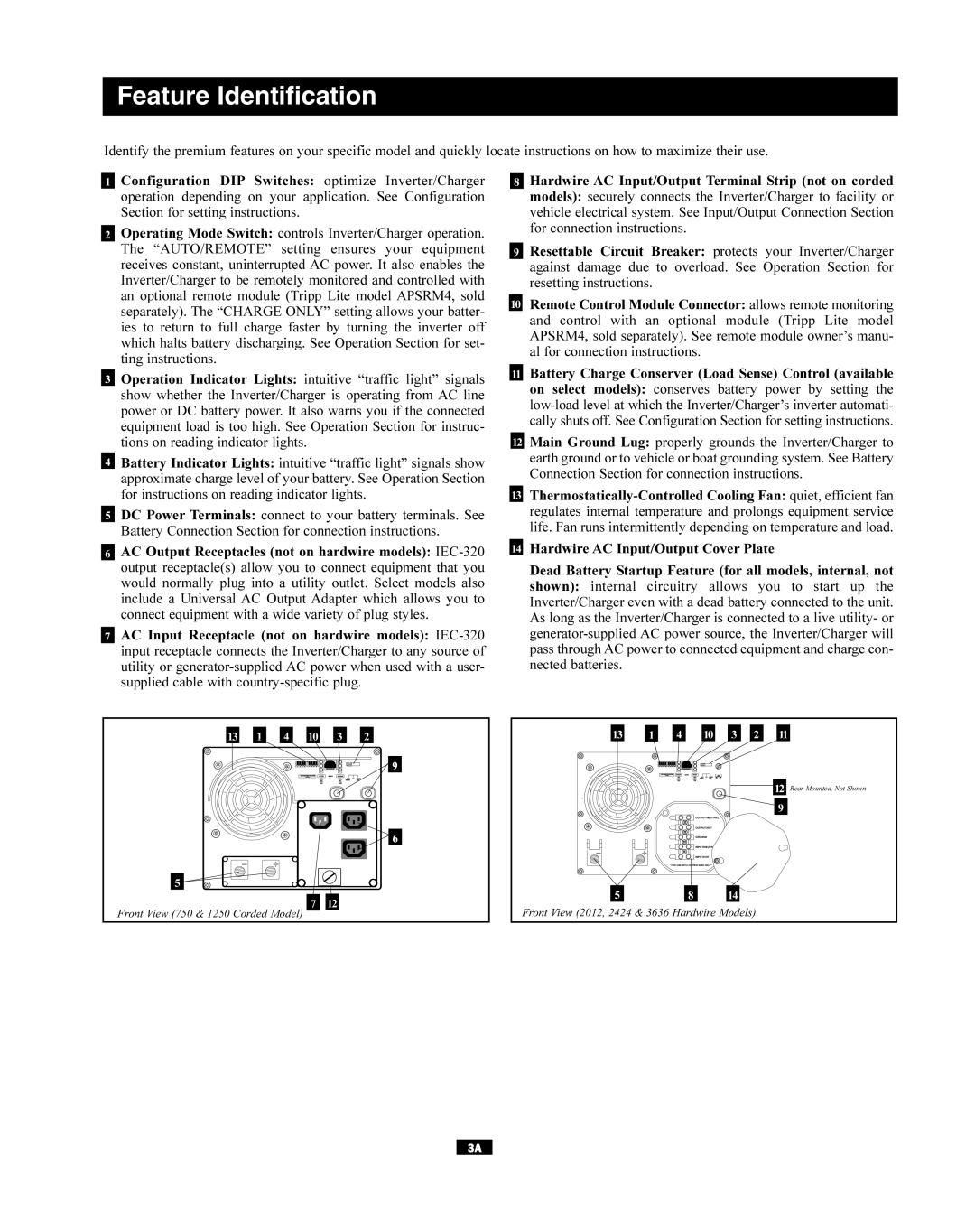
Feature Identification
Identify the premium features on your specific model and quickly locate instructions on how to maximize their use.
1 Configuration DIP Switches: optimize Inverter/Charger operation depending on your application. See Configuration Section for setting instructions.
2Operating Mode Switch: controls Inverter/Charger operation. The “AUTO/REMOTE” setting ensures your equipment receives constant, uninterrupted AC power. It also enables the Inverter/Charger to be remotely monitored and controlled with an optional remote module (Tripp Lite model APSRM4, sold separately). The “CHARGE ONLY” setting allows your batter- ies to return to full charge faster by turning the inverter off which halts battery discharging. See Operation Section for set- ting instructions.
8Hardwire AC Input/Output Terminal Strip (not on corded models): securely connects the Inverter/Charger to facility or vehicle electrical system. See Input/Output Connection Section for connection instructions.
9Resettable Circuit Breaker: protects your Inverter/Charger against damage due to overload. See Operation Section for resetting instructions.
10Remote Control Module Connector: allows remote monitoring and control with an optional module (Tripp Lite model APSRM4, sold separately). See remote module owner’s manu- al for connection instructions.
3Operation Indicator Lights: intuitive “traffic light” signals show whether the Inverter/Charger is operating from AC line power or DC battery power. It also warns you if the connected equipment load is too high. See Operation Section for instruc- tions on reading indicator lights.
4Battery Indicator Lights: intuitive “traffic light” signals show approximate charge level of your battery. See Operation Section for instructions on reading indicator lights.
5DC Power Terminals: connect to your battery terminals. See Battery Connection Section for connection instructions.
6AC Output Receptacles (not on hardwire models):
7AC Input Receptacle (not on hardwire models):
11Battery Charge Conserver (Load Sense) Control (available on select models): conserves battery power by setting the
12Main Ground Lug: properly grounds the Inverter/Charger to earth ground or to vehicle or boat grounding system. See Battery Connection Section for connection instructions.
13
14Hardwire AC Input/Output Cover Plate
Dead Battery Startup Feature (for all models, internal, not shown): internal circuitry allows you to start up the Inverter/Charger even with a dead battery connected to the unit. As long as the Inverter/Charger is connected to a live utility- or
13 |
| 1 |
| 4 |
| 10 |
| 3 |
| 2 |
| 13 |
| 1 |
| 4 |
| 10 |
| 3 |
| 2 |
| 11 |
|
|
|
|
|
|
|
|
|
|
|
|
|
|
|
|
|
|
|
|
|
|
|
|
|
9 |
12 Rear Mounted, Not Shown
9
|
| OUTPUT/NEUTRAL |
| |
| 6 | OUTPUT/HOT |
| |
| GROUND |
| ||
|
| INPUT/NEUTRAL |
| |
|
| INPUT/HOT |
| |
|
| “FOR USE WITH COPPER WIRE ONLY” |
| |
5 | 5 | 8 | 14 | |
7 | ||||
12 |
|
| ||
Front View (750 & 1250 Corded Model) | Front View (2012, 2424 & 3636 Hardwire Models). | |||
3A
